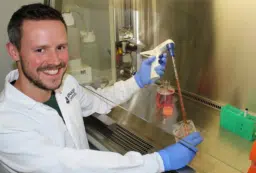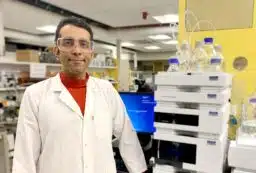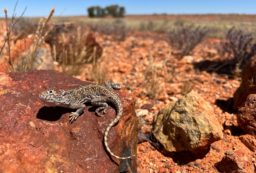Cows produce more milk if they are given a choice of food, according to a study released today in Melbourne.
“Presentation and choice of food affects how much we eat. It’s the same for cows,” says University of Melbourne researcher, Danni Marotti.
“We found that rather than growing mixtures of plant species together in a paddock, separating these same species into different areas of a paddock lets cows choose their own diet. This encourages them to eat more, make more milk and more important, it gives us ‘happier’ cows.”
“We gave four groups of cows different food choices and watched what they did. The cows that had a choice of a grass area or a clover area ate more, gave nearly 30% more milk.”
“We found that when animals graze mixed pastures they have to search through the pasture to find the species they prefer. Like trying to pick the pineapple out of fruit salad! This takes them longer, so they can’t eat as much. By separating the choices in the paddock, cows can go straight to what they want. ”
“This choice also allows cows to control their nutritional intake and helps them avoid nutrition related disorders – making them happier cows,” she says.
“The results showed that cows like choice – they always ate a mixed diet” said Danni. But the research team isn’t calling on farmers to introduce café society to their farms – not yet anyway.
“There would be practical farming problems in introducing split pastures. So we need to do some more research with larger groups of cows, and determine how a fodder choice system could be implemented on the farm,” says Danni.
“Our original research was supported by Australia’s Dairy Research and Development Corporation, and by New Zealand’s AgResearch. So we’ll be talking to them about designing a larger trial, and to others about incorporating the approach into their work to fit plants into novel agronomic and nutritional combinations” she says.
“We’d like to discover more about what animals chose to eat and why”, said Danni. “This could open up whole new ways of producing milk, meat or wool that are better for the farmer and the land, but also better for the end consumer – you and me. As consumers, we could benefit by having food and fibre products that are even better for our health and well-being”.
Danni hopes the original sponsors of the work, the Dairy Research and Development Corporation, University of Melbourne, and New Zealand’s AgResearch, will continue to support this exciting new area of investigation.
She is one of sixteen young scientists presenting their discoveries to the media, public and students for the first time, at Fresh Science.
“We’ve selected them from 105 national nominations, brought them to Melbourne, trained them and thrown them to the [media] lions,” said Niall Byrne, Chairman of Fresh Science. “It’s all about focussing public and media attention on Australian scientific achievement.”




 Fresh Science is on hold for 2022. We will be back in 2023.
Fresh Science is on hold for 2022. We will be back in 2023.
Post your comments